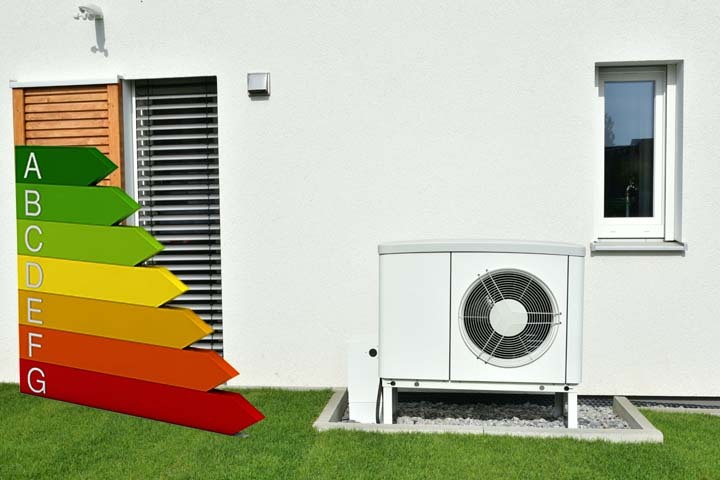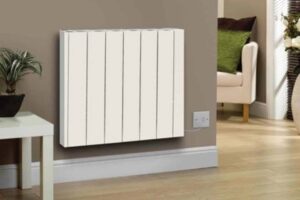Table of Contents
If you are considering the possibility of a heat pump installation, you might be curious what an EPC rating is. EPC stands for Energy Performance Certificate. This indicates how efficient your house is in terms of energy consumption. EPC ratings are defined as A-rating being the best, to G-rating being the worst.
Furthermore, your house’s EPC rating could determine the availability of a heat pump grant for you. This article provides an explanation on what EPC rating is required for a heat pump grant and the reasons why it is important.
What is an EPC Rating?
EPC rating is the measure of how much efficiently the energy is used in the house. It considers factors like the building’s insulation, the heating architecture, as well as the energy consumption. Houses that are fitted with effective insulating materials and energy-efficient appliances receive a higher score.
The EPC rating shows the homeowner where it is possible to make adjustments in order to conserve more energy. For instance, if your property’s EPC rating is poor, you may need to consider installing a more energy-efficient heating system or upgrading the insulation.
An energy-efficient heating system, such a heat pump, may significantly raise a home’s EPC rating and save energy costs.
Air Source Heat Pump Grants
Why Does EPC Rating Matter for Grants?
EPC ratings are considered in the heat pump grant and other heating upgrade schemes. Ofgem has specified EPC ratings that must be obtained before one is granted a heat pump.
This is because, as seen above, heat pumps are effective in well insulated houses. If your house has a poor EPC rating below D, the heat pump may not be so effective. Prior to securing the grant you may need to upgrade the insulation.
What EPC Rating Do You Need for a Heat Pump Grant?
To be eligible for the heat pump grant, your house must have an EPC rating of D or above. In cases where a house has an Energy Performance Certificate of A, B, C, or D, it may be eligible for the grant.
These ratings are often used for funding the energy efficiency improvements of buildings. You can then go ahead and apply for the heat pump grant once your house has an EPC rating of D or higher. The first step would be to enhance the energy efficiency of your home.
How to Improve Your EPC Rating
Your home is rated low-EPC if any of the building conditions do not conform to the minimum standard EPC. It’s an analysis to determine the current efficiency and the potential home efficiency that becomes achievable after installing energy improvements under the grants.
Most homes wear out with time, especially their insulation and fittings, which is the main reason for carrying out renovation works. Such changes help retain heat in the house and reduce energy consumption.
Getting an EPC Assessment
In order to be eligible for funding, you will be required to assess your property first. As such, an Energy Performance Certificate Epc will have to be carried out on your property.
An energy inspector will come to your house or apartment and evaluate its energy efficiency and give it a rating. He or she will examine both the interior and exterior insulation, heating system, and windows.
After this process, you will be issued with an EPC certificate for your home containing the rating. The certificate will indicate the rating of your property, and measures to achieve better rating free of charge in a few months. So if your home’s rating is already d or higher, please be prepared for the heat pump grant application process.
Can You Still Get a Grant with a Low EPC Rating?
Most people think that if their home will have a low EPC rating, they will not be eligible for the grant. You would, however, have to undertake some renovation work.
Owing to the domestic economic policy, the government provides funding only if the heat pumps are installed into energy saving houses.
This means that the appliance will be efficient and energy will not be wasted. If your rating is lower than D, you can seek assistance to upgrade the insulation and heating of your premises. After that, if you wish to apply for the grant again, it would be acceptable only if you improve your rating.
Why Are Heat Pumps Good for Energy Efficiency?
Using heaters to enhance a homeowner’s energy efficiency is quite a sensible option. It is clear that they use less energy than the most common heating equipment, gas boilers.
For example, a heat pump generates heat without using fossil fuels. Instead, it utilizes the heat it extracts from the ground or air outside to heat the inside.
Consequently, there is little, if any, emission of carbon dioxide as a result of this since they only draw heat from their surroundings. And this explains why heating that way is considered to be quite green. So if you are looking to save on your energy bill, immediately go out and install a heat pump.
What Grants Are Available for Heat Pumps?
Installing a heat pump, of course, incurs some cost but there are several grants available which can come in handy. The most common are the ECO4 and Boiler Upgrade Scheme (BUS). The latter helps towards the cost of a heat pump up to £7,500.
However, the ECO4 scheme exists to assist the energy efficiency of low income households without setting grant limits. The ultimate goal is to enhance EPC rating from below D to A, B or C.
How to Apply for a Heat Pump Grant?
Getting a heat pump grant is not complex. There is an initial requirement of getting an EPC rating for your home. If your rating is D or below, you are eligible to apply for the grant. You will have to attach evidence of your EPC rating with your application.
Information regarding your current heating system and energy bills may also be required. You can then proceed to submit an application via a registered installer after all the documents are ready for submission.
Common Mistakes to Avoid When Applying
Certain typical errors should be avoided when applying for a heat pump grant. One error would be to apply for the grant without first checking your EPC rating. Application will be denied if your rating is better than D, like A, B or C.
Another error is to apply without first addressing the insulation deficiency of your home. If your home needs an insulation upgrade, you might get a free insulation grant too that will make the air source heating grant process smoother and faster.
How Long Does It Take to Get a Grant?
Grants for heat pumps take different durations to avail. Factors depend on the EPC assessment and other documents validity, and verification of your given information. Grant application is subject to waiting for a few days or even weeks before one gets a green signal.
A heat pump can, however, be installed once the grant is approved. Occasionally, the whole procedure may take a couple of weeks or so. However, energy saving and utility will be worth the delay.
Benefits of Installing a Heat Pump
Heat pump installation in one’s house comes with a variety of advantages:
- It cuts down on energy consumption and costs because less energy is consumed in home heating.
- It is environmentally beneficial since it produces low carbon emissions.
- Heat pumps can increase your energy performance certificate (EPC) rating which in turn increases the worth of the house.
- Most of the payback periods can be shortened because of the availability of grants facilitating installation.
Conclusion
For you to be eligible for a heat pump grant, your property must have an EPC rating of D or below. If your rating is below D, there are changes you may make to increase it and they make your home able to save energy.
For instance including insulation, changing to modern windows or using energy conserving devices may help increase your rating.
After due diligence has been conducted and your house is up to the said EPC standards, you can proceed and fill in a air source heat pump grant application in which case the energy costs and home improvement will be enjoyed without the guilt of excess consumption.
Frequently Asked Questions
You need an EPC rating of D or better to qualify for a heat pump grant.
Yes, improving insulation, windows, and heating systems can raise your EPC rating to qualify for the grant.
An EPC assessment evaluates your home’s energy efficiency, giving it a rating from A (best) to G (worst).
First, get an EPC assessment. If your rating is D or better, you can apply online or through a registered installer.



